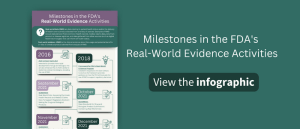FDA issues final guidance clarifying role of real-world data from electronic health records or medical claims in regulatory decision-making

The FDA’s final guidance establishes standards for data selection, validation, and quality to improve the reliability of using real-world data (RWD) from electronic health records (EHRs) and medical claims in regulatory decisions for drugs, enhancing real-world evidence (RWE) initiatives.
The US Food and Drug Administration (FDA) has announced the availability of its final guidance for industry titled, “Real-World Data: Assessing Electronic Health Records and Medical Claims Data To Support Regulatory Decision-Making for Drug and Biological Products.” This guidance is part of the FDA’s Real-World Evidence program and fulfills a mandate under the Federal Food, Drug, and Cosmetic Act (FD&C Act) to issue guidance on the use of RWE in regulatory decision-making.
The final guidance, updating the draft version from September 30, 2021, aims to assist sponsors and stakeholders in proposing the use of EHRs or medical claims data in clinical studies to support regulatory decisions on the effectiveness or safety of drugs and biological products. As with all FDA guidances, this document reflects the FDA’s current thinking on the topic and should be considered as recommendations. The use of the word ‘should’ in FDA guidances indicates suggestions or recommendations, but not requirements.
The 21st Century Cures Act, signed into law on December 13, 2016, added section 505F to the FD&C Act. This section prompted the FDA to create a framework for evaluating the potential use of RWE to support the approval of new indications for already approved drugs or to satisfy post approval study requirements. This framework is integral to the FDA’s RWE Program, which encompasses clinical studies utilizing real-world data (RWD) sources, such as routine clinical practice information.
RWD are defined as data relating to patient health status or the delivery of health care routinely collected from various sources, including EHRs and medical claims. RWE is the clinical evidence regarding the usage and potential benefits or risks of a medical product derived from the analysis of RWD.
 View our updated infographic timeline of recent FDA draft and final guidance:
View our updated infographic timeline of recent FDA draft and final guidance:
Infographic: Milestones in the FDA’s Real-World Evidence activities
The guidance document provides comprehensive recommendations on several critical topics related to the use of EHR and medical claims data in clinical studies:
- Selection of data sources: Ensuring that data sources appropriately address the study question and sufficiently characterize study populations, exposures, outcomes, and key covariates.
- Development and validation of definitions: Establishing clear definitions for study design elements such as exposures, outcomes, and covariates.
- Data traceability and quality: Maintaining data traceability and quality during data accrual, curation, and incorporation into the final study-specific dataset.
The guidance emphasizes that all essential elements of study design, analysis, conduct, and reporting should be predefined. For each study element, the protocol and final study report should detail how it was ascertained from the selected RWD source, including applicable validation studies. Notably, the guidance also notes the importance of engagement with the agency prior to study initiation enabling sponsors to, “discuss the study with the relevant FDA review division.”
The document also highlights the importance of understanding potential limitations of existing electronic healthcare data, as they were not originally developed for research purposes or regulatory submissions. For example, medical claims data might not accurately reflect certain diseases or their comprehensive management, and EHR data can vary depending on healthcare system practices and provider documentation.
The FDA’s final guidance provides a robust framework for the use of RWD from EHRs and medical claims data in regulatory decision-making, and is a stepping-stone towards the ongoing efforts to leverage RWE to bring innovations to patients more efficiently. Could the next step towards advancing the use of RWE be the introduction of ‘RWD certificates’ for data vendors ensuring the validation of data standards and quality? Such certification could provide a trusted benchmark for data reliability, fostering greater confidence among stakeholders, and ultimately driving more rapid and robust integration of RWE into the regulatory process.
Want regular updates on the latest real-world evidence news straight to your inbox? Become a member on The Evidence Base® today>>>






